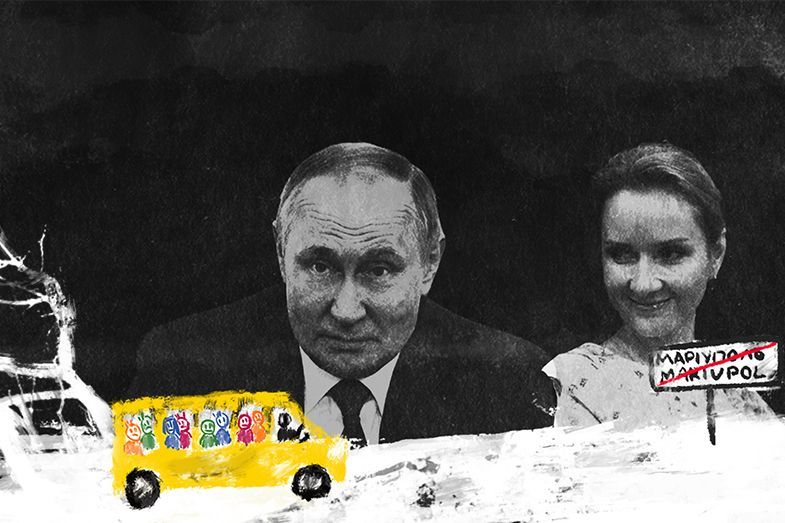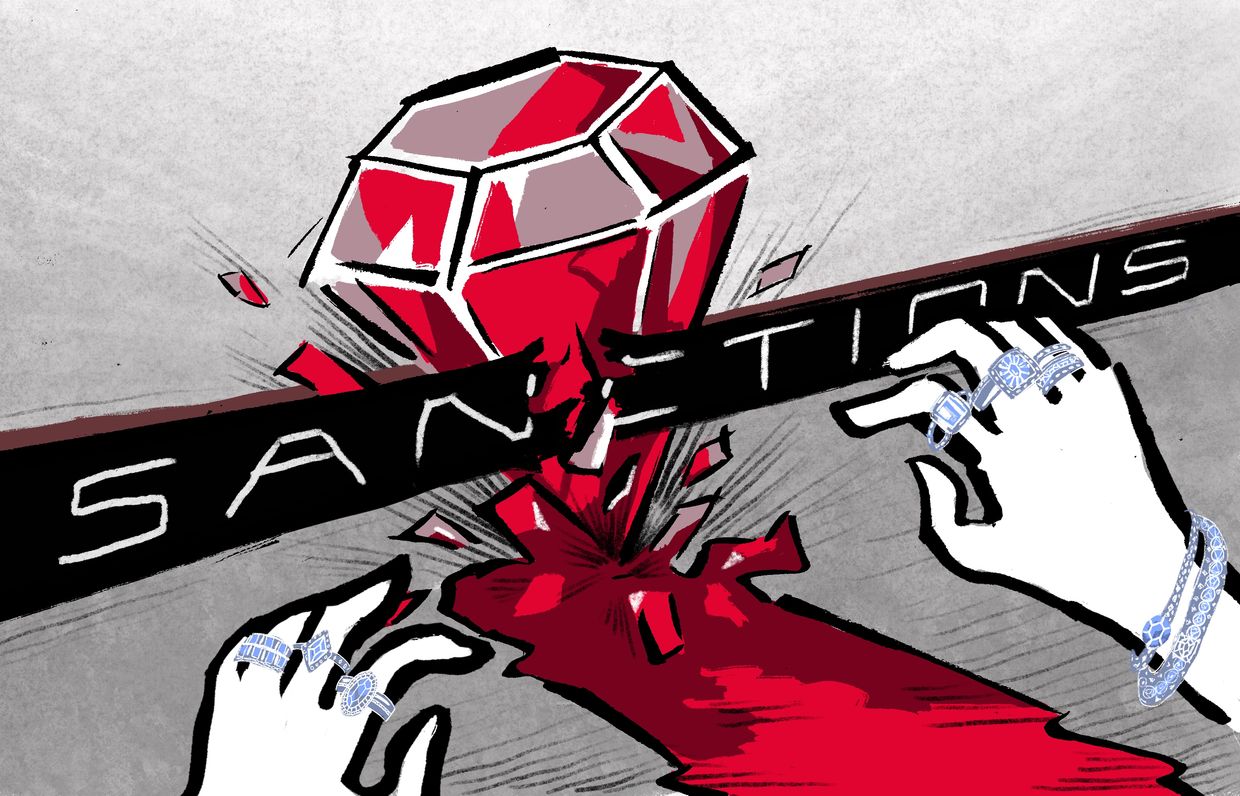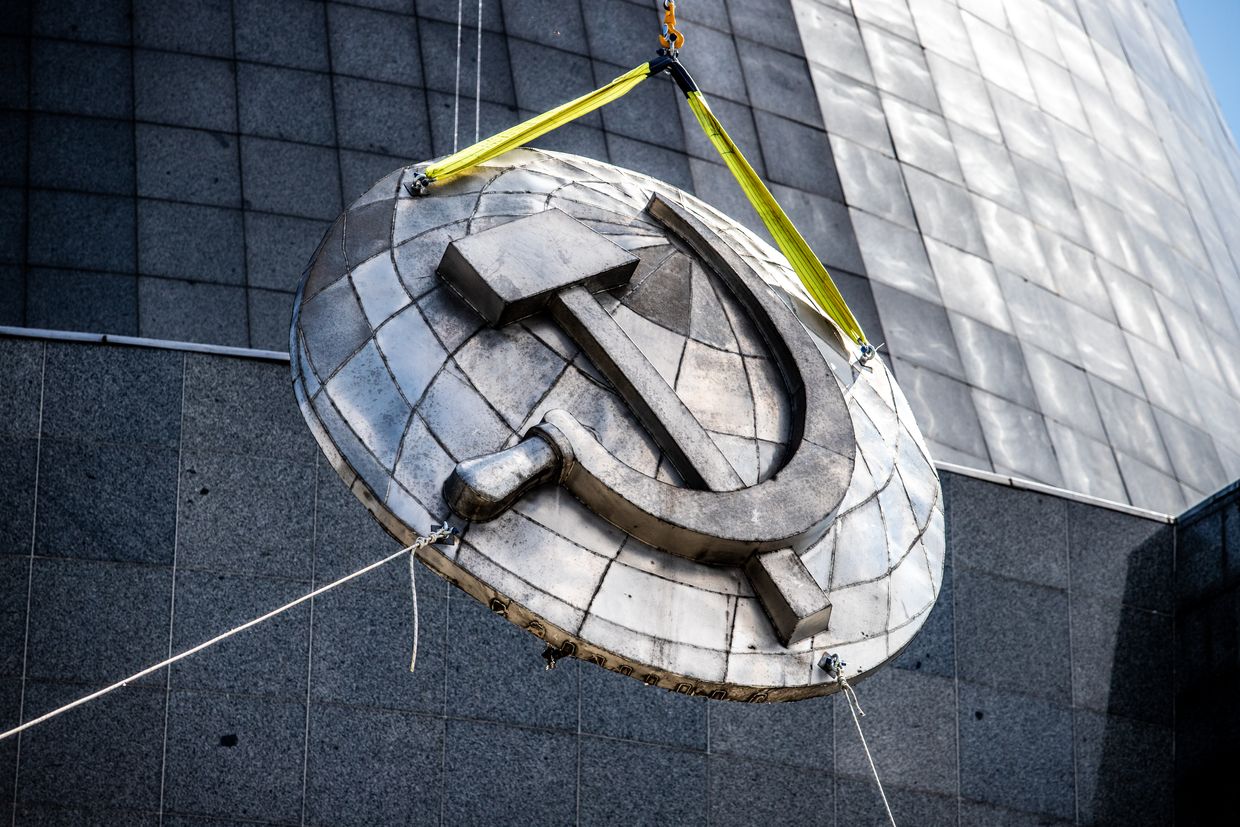Belarus Weekly: Minsk shows children abducted from Ukraine to foreign diplomats

The International Red Cross issues its Belarusian branch an ultimatum: If its current head is not dismissed, the Belarusian branch will no longer receive funding.
Minsk showcases children taken from Russian-occupied parts of Ukraine to foreign diplomats visiting Belarus.
Minsk announces the creation of a new chain of stores selling seized property.
The UN deems Belarus’ jailing of RFE/RL journalist Ihar Losik a violation of international law.
Meanwhile, witnesses report an explosion at a railway station near Minsk that is used extensively by the Russian military.
IFRC urges dismissal of Belarusian Red Cross head
The International Federation of Red Cross and Red Crescent Societies (IFRC) demanded that its Belarusian branch dismiss its chief, Dzmitryi Shautsou, after he bragged about taking children from Russian-occupied parts of Ukraine to Belarus.
The IFRC’s board said on Oct. 4 that it has given the Belarusian branch until Nov. 30 to dismiss Shautsou, or else it will suspend the branch and urge all stakeholders to stop cooperation with it.
Shautsou, who admitted in July to the Belarusian branch’s involvement in the forced deportation of children from Russian-occupied parts of Ukraine to Belarus, is accused of having breached the Red Cross’ rules on neutrality and integrity.
He was also shown in Russian-occupied parts of Ukraine’s Donbas region wearing military clothes adorned with the letter “Z,” which is a Russian pro-war symbol, and publicly praised the deployment of Russian nuclear weapons to Belarus.
The IFRC’s investigation concluded that Shautsou “breached Red Cross Red Crescent Fundamental Principles, misused the emblem, and breached the IFRC integrity policy,” and that he is solely responsible.
Back in July, the IFRC said it was “not made aware” of Shautsou’s visit to the Russian-occupied city of Lysychansk and is not “involved in any of the (Belarusian branch’s activities), including with children.”
Meanwhile, Belarusian state media said the Red Cross’ Belarusian branch voted unanimously on Sept. 7 to keep Shautsou in office. At the meeting, Shautsou vowed to continue “helping” children in Russian-occupied parts of Ukraine by bringing them to Belarus.
According to official estimates, Russia has abducted over 20,000 children from Russian-occupied parts of Ukraine, although the number is likely much higher. Belarusian authorities have themselves confirmed hosting Ukrainian children taken from Ukraine.
Belarusian opposition activist Pavel Latushka said in June that he provided the International Criminal Court (ICC) with information that allegedly detailed the forced transfer of over 2,000 Ukrainian children from at least 15 Russian-occupied Ukrainian cities to Belarus with Belarusian dictator Alexander Lukashenko’s approval.
The ICC issued an arrest warrant for Russian President Vladimir Putin and Russian Children’s Rights Commissioner Maria Lvova-Belova for organizing the illegal transfers.
The European Parliament called on the ICC to issue a similar arrest warrant against Lukashenko for his complicity in the crime, and Ukrainian Foreign Minister Dmytro Kuleba urged the ICC to do the same for Shautsou.
Minsk shows abducted Ukrainian children to foreign diplomats
Belarusian state media aired images of authorities in the Belarusian city of Navapolatsk showing a group of children taken from Russian-occupied parts of Ukraine to foreign diplomats.
Belarusian authorities claimed the two-day visit included 18 foreign diplomats from states including, but allegedly not limited to, China, India, Syria, Pakistan, Qatar, Mozambique, and several post-Soviet states.
The Belarus-accredited diplomats reportedly visited the places where 44 children from the Ukrainian cities of Lysychansk and Sievierodonetsk are kept, and “examined the kids’ living quarters and places of study, which they attend together with Belarusian peers.”
“Diplomats were given the opportunity to see the living conditions and infrastructure and talk to the children in order to form their own opinions of the situation,” Russia’s ambassador to Belarus, Boris Gryzlov, claimed.
The Ukrainian Foreign Ministry warned of the visit on Sept. 30, noting that Minsk “aims to legalize the illegal movement of Ukrainian children from the temporarily occupied territories of Ukraine.”
“According to international law, the forced deportation of children can be qualified as a war crime,” the ministry added.
“We strongly reject all accusations made against Belarus on this matter,” the Belarusian Foreign Affairs Ministry said.
Belarus launches retail chain selling seized property
The Belarusian Justice Ministry announced on Sept. 27 that a new chain of stores selling property seized by the state has been launched.
While the sale of confiscated goods and property has been an option on online platforms for a while in Belarus, there are now physical retail locations in the country’s cities of Vitsebsk, Homiel, Mahiliou, and Hrodno.
New stores are reportedly projected to open in the cities of Minsk and Brest.
The new retail chain raises concerns amid Lukashenko’s ongoing crackdown on those who oppose his regime.
There are at least 1,500 political prisoners in Belarus, and their prison sentences are often accompanied by the confiscation of assets and hefty fines.
The state-owned enterprise behind the retail chain, BelYurObespecheniye, sold Belarusian opposition leader Sviatlana Tsikhanouskaya’s apartment after it was confiscated, as well as the belongings of former presidential candidate and political prisoner Viktar Babaryka.
UN deems jailing of RFE/RL journalist in Belarus violation of international law
The United Nations Working Group on Arbitrary Detention has deemed Belarus’ jailing of Radio Free Europe/Radio Liberty (RFE/RL) journalist Ihar Losik a violation of international human rights law.
The working group concluded that Losik’s arrest was based “solely on his journalistic activity and his exercise of the freedoms of expression and association.”
The U.S.-based rights group Freedom Now said the conclusion was made following a legal petition it filed with the international law firm Dechert LLP.
Losik was a freelance writer for RFE/RL and the author of a Telegram channel that was the mouthpiece for political protests in Belarus after the fraudulent 2020 presidential election.
Belarusian authorities sentenced him to 15 years in prison in December 2021 on several charges, including organizing mass riots and the incitement of social hatred.
They also labeled him a so-called “terrorist,” a term often employed by Minsk to justify the imprisonment of those who opposed Lukashenko’s regime.
“Unfortunately (Losik) is just one of the many journalists imprisoned in a country that has repeatedly used the judicial system to punish dissent,” Freedom Now legal officer Adam Lhedmat said.
“We call on the government to abide by the Working Group’s decision on the freedom of press in Belarus.”
His wife, Darya Losik, was sentenced to two years in prison following an interview where she said her husband was illegally convicted. Belarusian authorities accused her of facilitating alleged “extremist activity,” and rejected her appeal against her prison sentence in March.
Back in March, Losik was transferred to a medical facility after Belarusian authorities claimed he attempted suicide while undertaking a hunger strike in solitary confinement.
Monitoring group: Explosion reported at Belarusian railway used by Russian military
Belarusian Hajun, a watchdog group that reports on the movement of Russian troops and weapons in Belarus, reported an explosion at a Belarusian railway used by the Russian military on Oct. 5.
According to Belarusian Hajun, residents of Kalodzishchy, a village near Minsk, heard an explosion at around 11:20 p.m. local time.
Belarusian law enforcement reportedly questioned the village’s residents the following morning and told them that a so-called “terrorist attack” had occurred at the Aziaryshcha railway station.
The Community of Railway Workers of Belarus, a group of Belarusian railway workers who oppose Lukashenko’s regime, reportedly confirmed the location of the explosion.
Citing preliminary information, the group said the blast likely damaged a portion of the railroad used for unloading and offloading cargo and military equipment.
Aliaksandr Azarau, the head of BYPOL, a group of former Belarusian law enforcement officers who oppose Lukashenko’s regime, said Belarusian authorities are searching for three individuals who they claim are responsible for the explosion.
However, Belarusian authorities have yet to comment on the alleged incident.
Giving Russian forces access to Belarusian territory and railways has been one of the central ways through which Minsk has supported Moscow in its war against Ukraine. Russia relies on Belarus’ railway system to transport troops and equipment to and from the front line in Ukraine, as well as to Russia.
After the start of the full-scale war, several railway sabotage attempts aimed at thwarting the Russian military’s movement within Belarus have been reported.
Putin and Lukashenko's love-hate relationship

The Spotlight segment provides readers with the historical context of contemporary events in Belarus.
At first glance, Putin and Lukashenko have a lot in common: They have both turned their countries into tinpot dictatorships, have been in power for over two decades, continue to glorify their Soviet pasts, actively suppress their respective civil societies, and help each other circumvent Western sanctions.
But Putin and Lukashenko’s relationship hasn’t always been smooth.
Lukashenko laid the foundation for closer ties with Russia in 1999 by signing a treaty on the creation of a so-called “Union State” with Moscow, suggesting, among other things, a shared currency, parliament, and border agreement.
At the time, Lukashenko had his eye on possibly leading the Union State — this obviously didn’t work out for him.
After nearly a decade, Lukashenko put his foot down and went against Russian interests by refusing to support Russia’s invasion of Georgia in 2008. To this day, Minsk does not officially recognize the parts of Georgia illegally occupied by Russia, Abkhazia and South Ossetia.
Belarus also did not recognize Crimea as Russian after Moscow illegally annexed the Ukrainian peninsula in 2014, although it has since changed tack.
Despite earning Belarus the title of “Europe’s last dictatorship” and isolating the country from the international community, Lukashenko has historically attempted to conduct Belarus’ foreign policy independently of Moscow.
However, the Belarusian economy continued to rely heavily on Russia — and even more so after the fraudulent 2020 Belarusian presidential election, which rendered Lukashenko’s regime a global pariah.
Below-market oil prices bestowed to Minsk by the Kremlin have been the crutch of the Belarusian economy.
However, tensions came to a head in 2019 when Moscow attempted to make Belarus pay for its crude oil at market price. As a result, Belarus is estimated to have lost $300 million in 2019 alone.
Russia also led so-called “trade wars” with Belarus over sugar imports from 2005 to 2007, dairy products in 2009, and fruit in 2019. In essence, Russia has often leveraged its economic power to get political concessions from Lukashenko.
Lukashenko resisted further integration and repeatedly maintained that deeper economic and military integration with Russia would threaten Belarus’s sovereignty.
Despite claiming to support Russia in its confrontation with NATO, Lukashenko sabotaged the establishment of Russian military bases in Belarus.
Before the massive protests in 2020, the existence of two military reconnaissance units that have been in Belarus for 25 years rent-free was jeopardized.
During the 2020 presidential campaign, Lukashenko ousted two of his rivals, citing their alleged ties with Russia. In 2020, 33 Russian men, reportedly employed by Wagner Group, were detained in Belarus. Lukashenko claimed they arrived to “destabilize” the country prior to the elections.
But after the Kremlin assisted Lukashenko amidst massive street protests following a fraudulent presidential election in 2020, the Belarusian dictator went all-in on Putin, relying on Russia’s financial, military, and political assistance.
Putin promised Lukashenko law enforcement support to “ensure security” in Belarus and a $1.5 billion loan.
A number of Union State integration roadmaps were finally signed, Lukashenko admitted he would recognize Crimea as Russian, welcomed Russian tactical nuclear weapons, and turned Belarus’ territory into a staging ground for the Russian invasion of Ukraine, a training range, and the refuge for rebellious Wagner mercenaries.
Yet, as Belarus became fully dependent on Russia, Lukashenko is still attempting to restore his agency by offering himself as an intermediary in negotiations between Russia and Ukraine or having the Belarusian Foreign Ministry send out non-public letters to the EU and several European diplomats calling to restore the dialogue with Belarus.













